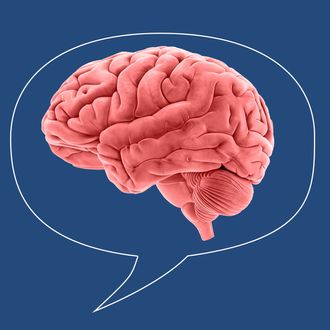
Next time you feel you are in danger of losing an argument, make some obscure reference to the brain. Any nod to neuroscience will do, even if it doesn’t actually illuminate the problem at hand or prove anything that halfway resembles a point. People tend to find explanations that include references to the brain very convincing, even if those references are mostly nonsense, according to the latest episode of “Psych Crunch,” a podcast hosted by psychologist (and Science of Us contributor) Christian Jarrett.
Jarrett interviews Sara Hodges, a research psychologist at the University of Oregon and the co-author of a study published this May on the appeal of “superfluous neuroscience information.” In it, Hodges and her colleagues presented students with a variety of explanations for various psychological phenomena. Some of these explanations were not really explanations at all, but rather just a restatement of the facts already presented. The students considered explanations for various quirks of human behavior from the fields of social science, biological science, and neuroscience, and rated how convincing they found each explanation.
“The social sciences would refer to something about how people were raised, and the hard-science explanation referred to changes in DNA, the structure of DNA,” Hodges explained to Jarrett. The neuroscience explanation, on the other hand, would pretty much just name an area of the brain thought to be associated with the behavior at hand and leave matters at that, without really explaining anything. Even still, Hodges said, the “neuroscience explanations always came out on top — better than no explanation, better than social science, better than the hard science.”
Something about the seemingly impenetrable mysteries of the brain seems to cause people to decide they don’t need to bother with critical thinking, which, incidentally, is one potential reason why “brain training” apps and the like are so popular, despite the lack of evidence to back them up. Something to keep in mind — or, rather, in your anterior cingulate cortex.




